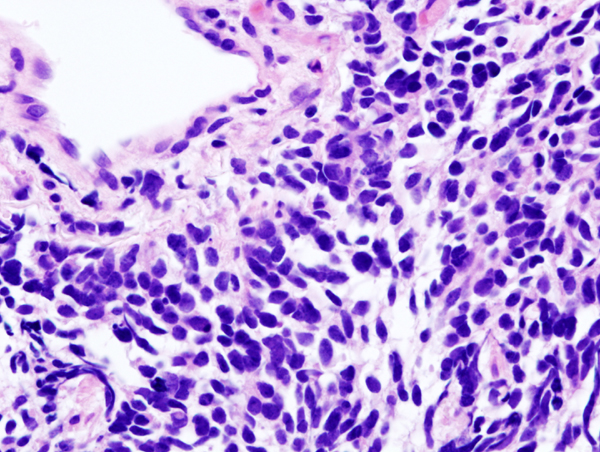Increasing Treatment Options for Small Cell Lung Cancer Patients
The FDA has approved a new combination of immunotherapy and chemotherapy as an initial treatment for extensive-stage small cell lung cancer.

The U.S. Food and Drug Administration (FDA) has approved expanding the use of the immunotherapeutic durvalumab (Imfinzi) to include its use in combination with two chemotherapeutics for the initial treatment of patients with extensive-stage small cell lung cancer (SCLC).
Durvalumab is a type of immunotherapeutic called a checkpoint inhibitor. With this approval, durvalumab became the second checkpoint inhibitor approved by the FDA for use as an initial treatment for patients newly diagnosed with extensive-stage SCLC. The first, atezolizumab (Tecentriq), was approved for this use in combination with etoposide and carboplatin in March 2019.
Lung cancer is the second most commonly diagnosed cancer in the United States, with more than 225,000 new cases a year in the United States, according to the National Cancer Institute (NCI). SCLC will account for about 15 percent of these cases, which means more than 34,000 people will be diagnosed with this form of the disease this year. Unfortunately, most patients – about 70 percent – are diagnosed with extensive-stage SCLC, which means the cancer has spread beyond the lung, or the area between the lungs or the lymph nodes above the collarbone to other parts of the body, according to the NCI.
Until the approval of atezolizumab and chemotherapy in March 2019, the median survival for patients with extensive-stage SCLC was about six to 12 months, according to the NCI. In the clinical trial that led to the approval of the atezolizumab–chemotherapy combination, the median overall survival among patients who received the combination was 12.3 months compared with 10.3 months among those who received placebo and chemotherapy.
The approval of durvalumab in combination with two cytotoxic chemotherapeutics—etoposide and either carboplatin or cisplatin—was based on results from the randomized, phase III CASPIAN clinical trial. The results, which were published in The Lancet, showed that among the 268 patients with previously untreated extensive-stage SLCLC who received durvalumab and chemotherapy, the median overall survival was 13.0 months. The median overall survival was significantly less, 10.3 months, among the 269 patients who received placebo and chemotherapy.
Before this approval for extensive-stage SLCLC, durvalumab was approved by the FDA for treating certain patients with bladder cancer in May 2017, and for treating certain patients with stage III non-small cell lung cancer in February 2018.
The FDA approval was rendered on March 27, 2020.
